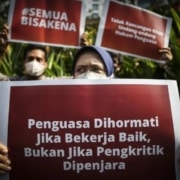
Indonesia President Joko Widodo inspects Indonesia’s first electric vehicle charging station in 2022. Photo by Antara/HO-PLN/uyu.
A range of measures to build closer economic ties between Australia and Indonesia were unveiled during Indonesian President Joko “Jokowi” Widodo’s well publicised visit to Sydney this month. Perhaps the most striking was proposed cooperation on the manufacture of batteries and electric vehicles (EV).
The partnership is motivated by the fact that both Indonesia and Australia have complementary factors of production. Indonesia, the world’s largest archipelago, boasts vast reserves of crucial battery minerals like nickel, cobalt, and manganese. The only mineral it lacks is lithium.
Australia is also rich in critical minerals, including the world’s largest stocks of lithium. It accounted for 43% of lithium extraction globally in 2022.
This combination offers a unique opportunity for battery manufacturers to establish a robust and sustainable supply chain, reducing reliance on imports and ensuring a consistent source of raw materials for the burgeoning EV market.
Electric futures
Both countries are now building EVs into their long-term economic strategies.
Indonesia has declared its intention to become a global EV hub. A government ban on the export of critical minerals has been instrumental in helping Indonesia develop downstream processing capabilities for its critical minerals. Although the export ban has drawn criticism for local content requirements, it is catalysing much needed foreign investment in nickel smelters and battery manufacturing facilities.
To build domestic demand, the Indonesian government has set a goal for EVs to make up 20% of all domestic cars sold and 20% of total domestic motorbikes sold by 2025. According to the Ministry of Energy, to meet the target, Indonesia must have 2 million electric cars and 13 million electric motorcycles on the road by 2030.
Australia has also made its EV ambitions well known. The Australian government, in collaboration with industry partners, has initiated several initiatives to bolster domestic battery manufacturing capabilities and secure a sustainable supply chain of critical minerals.
For instance, the government’s $1.3 billion Modern Manufacturing Initiative plans to establish a sovereign battery industry by investing in research and development and advanced manufacturing techniques. Additionally, Australia’s Critical Minerals Strategy aims to attract investment and develop the nation’s critical minerals sector, which includes resources crucial for battery production.
Building on low demand
Despite grand ambitions, both Indonesia and Australia have to build on low domestic demand. Indonesia sold just over 15 thousand EVs in 2022. Uptake is also slow in Australia, where EV sales accounted for just 15.6% percent of new vehicle sales – well behind some advanced economies, like Norway, where electric vehicles account for over 80% of new vehicles sold.
In Indonesia, several barriers exist including the high upfront costs for EVs, the limited functionality and range of e‑motorbikes, and a lack of awareness among consumers. Increasing the availability of charging stations and battery swap facilities is also important to address infrastructure challenge. According to the Indonesia Electric Vehicle Outlook, while charging stations recorded 200% growth in 2022, 88% are still located in Jakarta and Bali. For motorcycles, the absence of widespread battery swap facilities is a key factor in discouraging ownership.
Concerns about range and charging infrastructure also prevail in Australia, where long journeys separate major urban centres.
Support industries are already reacting
It remains to be seen how deeply the Australian and Indonesian governments are willing to collaborate on EVs and batteries. Despite speculation, a new battery joint venture did not materialise during Jokowi’s recent visit and the Australian government stopped short of guaranteeing Indonesia the lithium it desires.
But with both nations investing so heavily in EVs, we can expect a transnational green technology ecosystem to emerge organically regardless of the commitments national governments make one another. While only a handful of large corporations manufacture batteries and EVs globally, EV industries involve a complex network of startups, corporates, researchers, investors and civil society organisations – and these stakeholders are drawn from a wide range of support industries.
Now that both countries are fully committed to development of domestic EV industries, these two neighbouring industries will start to cross-pollinate as agile organisations identify opportunities next door. And we can see this happening already among support industries with advanced levels of transnational cooperation.
For instance, Australia has a long history of participation and investment in Indonesia’s extractive industries. Western Australia has already signed a Plan of Action with the Indonesian Chamber of Commerce and Industry (KADIN). Even without the export of lithium, Australia is well placed to share best practices and export mining technology and services to Indonesia as it looks to establish downstream processing capabilities.
Research and development is also central for the development and adoption of EV technologies. The University of Wollongong’s Institute for Superconducting and Electronic Materials (ISEM) and the Indonesian Institute of Sciences (now BRIN) have signed a Memorandum of Understanding to collaborate on battery research and development, with a specific focus on developing sustainable energy solutions for Indonesia’s transportation sector. Partnerships like this may accelerate as more Australian universities establish new offshore campuses in Indonesia.
Financing initiatives also play a pivotal role in supporting the growth of the battery and EV industries. A new $50 million Australian government initiative can help Indonesia make its clean energy transition by offering finance to startups. Partnerships between Indonesia and Australia on this front can create an environment conducive to private sector participation and facilitate capital flow into clean energy projects.
A new green tech ecosystem
Details of the EV partnership between Indonesia and Australia are still opaque. But, regardless, the shared commitment of Australia and Indonesia to their own battery and EV industries could mark a significant milestone in the quest for closer economic relations and more sustainable transportation.
For both countries to fully realise the potential of their EV industries, it will be important for the Australian and Indonesian governments to facilitate the development of a broader ecosystem that can accelerate the transfer of knowledge, capital, skills and culture. By fostering a collaborative ecosystem and forging long-term partnerships, Indonesia and Australia can drive innovation, meet their economic goals, and emerge as global leaders in clean energy technologies.


 https://en.antaranews.com/news/222277/pln-offers-30-discount-to-electric-vehicle-owners
https://en.antaranews.com/news/222277/pln-offers-30-discount-to-electric-vehicle-owners






 https://kalteng.antaranews.com/berita/327901/pemprov-beri-sanksi-pns-malas
https://kalteng.antaranews.com/berita/327901/pemprov-beri-sanksi-pns-malas https://www.flickr.com/photos/rabhauke/30854273191/
https://www.flickr.com/photos/rabhauke/30854273191/